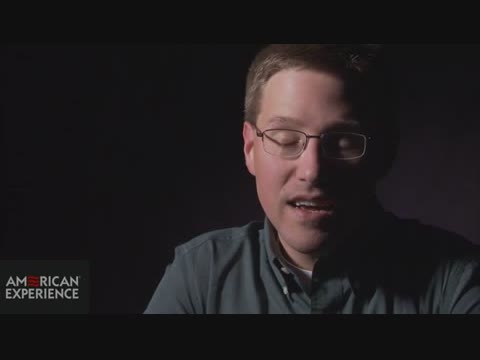American Experience; The Abolitionists; Interview with W. Caleb McDaniel, part 1 of 4
- Series
- American Experience
- Episode
- The Abolitionists
- Raw Footage
- Interview with W. Caleb McDaniel, part 1 of 4
- Contributing Organization
- WGBH (Boston, Massachusetts)
- AAPB ID
- cpb-aacip-15-7h1dj59d4j
If you have more information about this item than what is given here, or if you have concerns about this record, we want to know! Contact us, indicating the AAPB ID (cpb-aacip-15-7h1dj59d4j).
- Description
- Description
- W. Caleb McDaniel is an assistant professor of history at Rice University and a scholar of the nineteenth-century United States and author of the book: The Problem of Democracy in the Age of Slavery: Garrisonian Abolitionists and Transatlantic Reform.
- Topics
- Biography
- History
- Race and Ethnicity
- Subjects
- American history, African Americans, civil rights, racism, abolition
- Rights
- (c) 2013-2017 WGBH Educational Foundation
- Media type
- Moving Image
- Duration
- 00:29:10
- Credits
-
- AAPB Contributor Holdings
-
WGBH
Identifier: cpb-aacip-1139c6862ff (Filename)
Duration: 0:29:10
-
Identifier: cpb-aacip-274d4021030 (unknown)
Format: video/mp4
Generation: Proxy
Duration: 00:29:10
If you have a copy of this asset and would like us to add it to our catalog, please contact us.
- Citations
- Chicago: “American Experience; The Abolitionists; Interview with W. Caleb McDaniel, part 1 of 4,” WGBH, American Archive of Public Broadcasting (GBH and the Library of Congress), Boston, MA and Washington, DC, accessed December 20, 2025, http://americanarchive.org/catalog/cpb-aacip-15-7h1dj59d4j.
- MLA: “American Experience; The Abolitionists; Interview with W. Caleb McDaniel, part 1 of 4.” WGBH, American Archive of Public Broadcasting (GBH and the Library of Congress), Boston, MA and Washington, DC. Web. December 20, 2025. <http://americanarchive.org/catalog/cpb-aacip-15-7h1dj59d4j>.
- APA: American Experience; The Abolitionists; Interview with W. Caleb McDaniel, part 1 of 4. Boston, MA: WGBH, American Archive of Public Broadcasting (GBH and the Library of Congress), Boston, MA and Washington, DC. Retrieved from http://americanarchive.org/catalog/cpb-aacip-15-7h1dj59d4j
